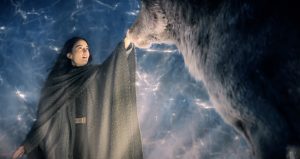A lot of people are going to be rushing to Netflix next Friday to binge-watch the entire first season of Shadow And Bone as soon as it drops, but only a portion of that audience will have a chance to read or even page-skim through the entirety of the series’ literary source-material in the six days we have left before the hotly-anticipated premiere. But that’s okay, because I’m here to give you the rundown of everything you need to know about the world of Leigh Bardugo’s twin series’ of fantasy novels, the Shadow And Bone trilogy and the Six Of Crows duology, and the premise of the Netflix show, which will draw inspiration from the first books of both series’.

The expansive world of Bardugo’s novels, dubbed the “Grishaverse” by fans and author alike, is largely similar to the Europe and West Asia of our own, but for the most part grounded in the aesthetics, societal norms, and steam and gas-powered technology, of the late 1800’s. Some might call this steampunk, but Bardugo coined the more unique term “Tzarpunk” to describe the setting of her debut novel, Shadow And Bone, and its direct sequels, which take place in the northerly region of Ravka – unmistakably influenced by Russia under the final Tzars, from the opulent lifestyle of the country’s royalty all the way down to the brutal oppression of the working class. If history is doomed to repeat itself even in fantasy, then Ravka is in for a communist revolution any day now.
But while Ravka is a straight-up monarchy, the true power lies in the hands of the Grisha – an elite, militarized order of humans gifted with the ability to manipulate or alter matter. And although the Grisha describe their “magic” as being scientific in nature (and a bunch of them are employed only for their ability to de-age Ravka’s upper class), the misconception that they’re a coven of evil witches persists among the general population, and they are widely hated and feared. Nonetheless, they make up a small but deadly faction of Ravka’s army, and they get to live in a palace near the capital.
The Grisha are also quartered off into numerous subdivisions, something I hope the Netflix adaptation explores in-depth – because J.K. Rowling ruined Hogwarts Houses for a lot of people, so we need a new method of separating personality types by way of pop culture references…and “Heartrender” sounds a lot cooler than Hufflepuff anyway, I’m just saying. But there’s one person in a category of her own, and that’s Alina Starkov, Shadow And Bone‘s protagonist. The only Sun-Summoner in the world, Starkov has the ability to control light – a power-set that might seem of limited use until you remember that Ravka is split down the middle by a literal ink-stain on the map, a wall of darkness named the Shadow-Fold.
Blocking most trade between Ravka’s coast and its more densely-populated interior, the Shadow-Fold can only be traversed by tiny skiffs that must pass through the wall and avoid encountering the horrific winged demons that roam in the darkness, known as Volcra. Shadow And Bone kicks off with Alina Starkov, still just a humble mapmaker conscripted into Ravka’s non-Grisha army, joining one of these routine trips through the Fold: and when she discovers that she’s a sentient nightlight that could potentially eradicate the Shadow-Fold entirely, well, things happen. This post is free of any major spoilers about the books, so I’ll refrain from saying what those “things” are, but come on, the show’s only six days away, people! Be patient!

Just a few years after the events of Shadow And Bone and its sequels, Six Of Crows picks up the story in a vastly different corner of the Grishaverse, in the bustling, grimy, canal-laced port-city of Ketterdam, separated from Ravka by many miles and an entire ocean. Modeled off of Amsterdam at the peak of Dutch imperialism in the 1600’s but with a bit of Bardugo’s signature Tzarpunk mixed in, Ketterdam is home to several street-gangs which fight for control over the flow of imports and exports through the city’s docks, trade-districts, and markets.
When Six Of Crows opens, the gang known as the Dregs (who operate out of the infamous Crow Club) are already a feared and respected force in Ketterdam’s criminal underworld, thanks to the strategizing skills of their highest-ranking member, Kaz Brekker. To account for the time-gap between Bardugo’s two series’, the first season of Netflix’s Shadow And Bone won’t be adapting Six Of Crows, but will instead follow the founding members of the gang prior to the events of their book – or at least, so Netflix says. A recent trailer (my breakdown linked below, but watch out for spoilers!) revealed that Netflix is basically just using the plot of Six Of Crows but weaving it into the events of Shadow And Bone in a bold and risky move that I hope pays off.
In the books, the strongest link between the two series’ is the character of Nina Zenik, a Grisha from Ravka who gets taken captive by her nation’s unfriendly neighbors to the north, the Fjerdans – specifically by a group of Fjerdan religious zealots named the drüskelle, who despise the Grisha. Nina’s interactions with them lead to her eventually finding refuge in Ketterdam and joining the Dregs, and her knowledge of Fjerda helps the gang when they take on their most dangerous mission ever as a team – to break into a heavily-fortified Fjerdan palace and abduct a valuable prisoner. A waffle-loving bisexual style icon, Nina unfortunately seems to only play a small part in Shadow And Bone‘s first season.

Sure, there’s a couple of world-building details I’ve left out, but that’s essentially all you need to know about the Grishaverse before watching Netflix’s Shadow And Bone. I mean, technically, you shouldn’t even need to know anything because a good adaptation allows even the most casual viewer to ease into the story, but hey – if I can exploit the fact that very few adaptations remember that golden rule, I will absolutely continue to do so because I have fun writing these breakdowns, and they drive traffic to my blog (*prides himself on his Kaz Brekker-like business savvy and exits, pursued by disgruntled readers*).